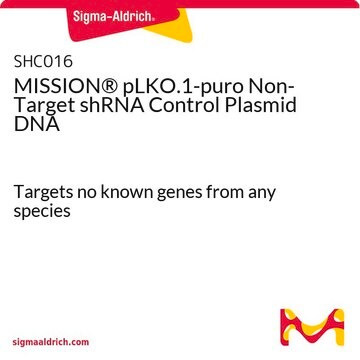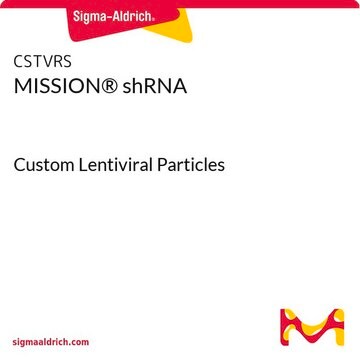Fontos dokumentumok
SHC016V
MISSION® pLKO.1-puro Non-Target shRNA Control Transduction Particles
Targets no known genes from any species
Szinonimák:
MISSION®, MISSION® Control Transduction Particles, negative control, negative shRNA control, non-target control, non-target shRNA, non-target shRNA control, shRNA control
About This Item
Javasolt termékek
Minőségi szint
termékcsalád
MISSION®
koncentráció
≥1x106 VP/ml (via p24 assay)
kiszállítva
dry ice
tárolási hőmérséklet
−70°C
Looking for similar products? Látogasson el ide Útmutató a termékösszehasonlításhoz
Related Categories
Általános leírás
To see more application data, protocols, vector maps visit sigma.com/shrna.
Alkalmazás
Analízis megjegyzés
Jogi információk
Nem találja a megfelelő terméket?
Próbálja ki a Termékválasztó eszköz. eszközt
javasolt
Tárolási osztály kódja
12 - Non Combustible Liquids
WGK
WGK 3
Lobbanási pont (F)
Not applicable
Lobbanási pont (C)
Not applicable
Válasszon a legfrissebb verziók közül:
Analitikai tanúsítványok (COA)
Nem találja a megfelelő verziót?
Ha egy adott verzióra van szüksége, a tétel- vagy cikkszám alapján rákereshet egy adott tanúsítványra.
Már rendelkezik ezzel a termékkel?
Az Ön által nemrégiben megvásárolt termékekre vonatkozó dokumentumokat a Dokumentumtárban találja.
Az ügyfelek ezeket is megtekintették
Tudóscsoportunk valamennyi kutatási területen rendelkezik tapasztalattal, beleértve az élettudományt, az anyagtudományt, a kémiai szintézist, a kromatográfiát, az analitikát és még sok más területet.
Lépjen kapcsolatba a szaktanácsadással







